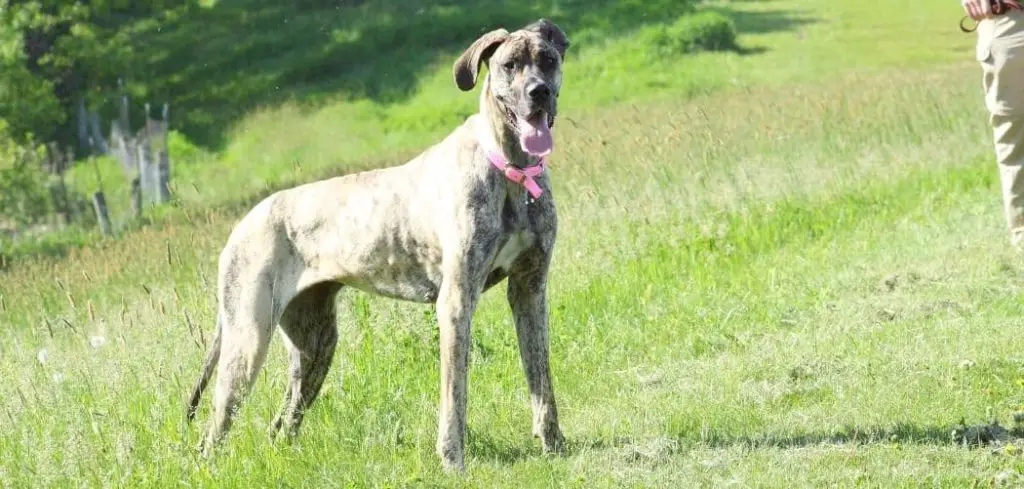Great Danes are known for their large size, strong build, and elegant stature.
However, if you notice your Great Dane losing weight unexpectedly, it can be alarming.
Weight loss in Great Danes can be caused by various factors, ranging from medical conditions to dietary issues and lifestyle changes.
We outline the common reasons why a Great Dane may be losing weight, when to seek veterinary attention, and practical solutions to help your dog regain a healthy weight.
Common Causes of Weight Loss in Great Danes

1. Inadequate Diet and Nutritional Deficiencies
A Great Dane’s dietary needs are vastly different from smaller dog breeds due to their rapid growth rate and large size.
If your Great Dane is not receiving adequate calories, protein, or essential nutrients, they may start losing weight.
Signs of Nutritional Deficiency:
Dull coat
Low energy levels
Visible ribs and hip bones
Muscle wasting
Solution: Ensure that your Great Dane is fed a high-quality, high-protein diet specifically formulated for giant breeds.
Consult with your veterinarian or a canine nutritionist to ensure the diet meets their caloric and nutritional needs.
2. Gastrointestinal Issues (Malabsorption & Malnutrition)
Digestive disorders can prevent your Great Dane from absorbing nutrients properly, leading to weight loss.
Some common gastrointestinal conditions include:
Exocrine Pancreatic Insufficiency (EPI): A condition where the pancreas fails to produce enough digestive enzymes, leading to poor nutrient absorption.
Inflammatory Bowel Disease (IBD): Chronic inflammation in the intestines that disrupts digestion.
Worms and Parasites: Intestinal parasites like hookworms, roundworms, and tapeworms can steal essential nutrients.
Related: Great Dane constipated (Explained)
Solution: If you suspect digestive issues, consult a veterinarian for diagnostic tests such as fecal exams, blood work, or endoscopy.
A prescription diet and medications may be necessary.
3. Hyperthyroidism or Other Hormonal Imbalances
While hyperthyroidism is rare in dogs, it can occur and lead to rapid weight loss.
This condition results in an overactive thyroid gland, increasing metabolism and causing excessive calorie burning.
Symptoms of Hyperthyroidism:
Increased appetite but continued weight loss
Hyperactivity or restlessness
Increased heart rate
Solution: A veterinarian can conduct blood tests to diagnose hyperthyroidism and recommend appropriate treatment, such as medication or surgery.
4. Cancer and Tumors
Cancer is a significant concern in older Great Danes.
Certain cancers, like lymphoma, hemangiosarcoma, or osteosarcoma, can cause weight loss due to the body using extra energy to fight the disease or due to a loss of appetite.
Symptoms of Cancer in Great Danes:
Sudden weight loss
Loss of appetite
Lethargy
Swelling or lumps
Solution: Early diagnosis is crucial. If you notice any concerning symptoms, schedule a veterinary exam, including imaging tests like X-rays or ultrasounds.
5. Stress and Anxiety
Dogs, just like humans, can experience stress that impacts their weight.
Great Danes are known for their sensitive nature, and any major lifestyle changes—such as moving to a new home, loss of a companion, or prolonged separation anxiety—can lead to weight loss.
Signs of Stress-Related Weight Loss:
Pacing and restlessness
Decreased appetite
Excessive licking or chewing
Changes in sleeping patterns
Solution: Provide a stable, comfortable environment with a consistent routine.
Interactive toys, training, and mental stimulation can help reduce stress in anxious dogs.
Related: Why is my Great Dane sad? (Here’s Why)
6. Old Age and Muscle Atrophy
As Great Danes age, they naturally lose muscle mass due to reduced activity and changes in metabolism. While some weight loss is normal, excessive loss may indicate underlying health issues such as arthritis or organ dysfunction.
Signs of Age-Related Weight Loss:
Weakness in the legs
Difficulty standing or climbing stairs
Decreased appetite
Solution: Adjust their diet to include more easily digestible proteins, joint supplements, and provide low-impact exercises such as short walks or swimming to maintain muscle tone.
When Should You Be Concerned About Your Great Dane’s Weight Loss?
If your Great Dane loses more than 10% of their body weight without a clear reason, it is crucial to consult a veterinarian. Some warning signs that require immediate attention include:
Extreme lethargy
Persistent vomiting or diarrhea
Unexplained pain or discomfort
Sudden behavioral changes
How to Help Your Great Dane Gain Weight Safely
Feed More Frequent, High-Calorie Meals
Offer three to four smaller meals per day instead of two large meals.
Choose a calorie-dense dog food with high protein and fat content.
Consider Supplemental Nutrition
Add healthy fats such as salmon oil or coconut oil.
Use veterinarian-approved weight gain supplements.
Ensure a Parasite-Free System
Regular deworming and fecal tests help eliminate internal parasites.
Encourage Exercise to Build Muscle Mass
Engage your dog in strength-building activities such as light resistance training or short jogs.
Address Any Underlying Medical Issues
Regular veterinary check-ups can help detect health problems early.
Key Takeaway
Unexplained weight loss in a Great Dane should never be ignored.
Whether it’s due to diet, medical conditions, stress, or aging, identifying the underlying cause is essential to restoring your dog’s health.
If you notice significant weight loss, consult a veterinarian to rule out serious conditions and create a tailored nutrition and care plan.
By ensuring your Great Dane has a balanced diet, proper veterinary care, and a stress-free environment, you can help them maintain a healthy weight and enjoy a long, happy life.
Sources:
